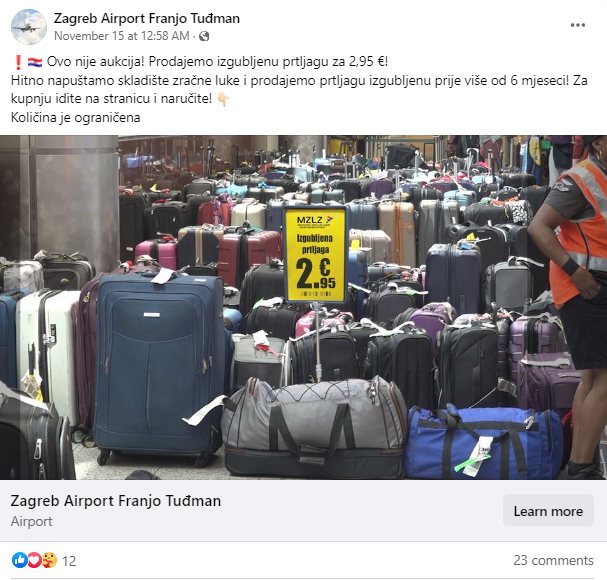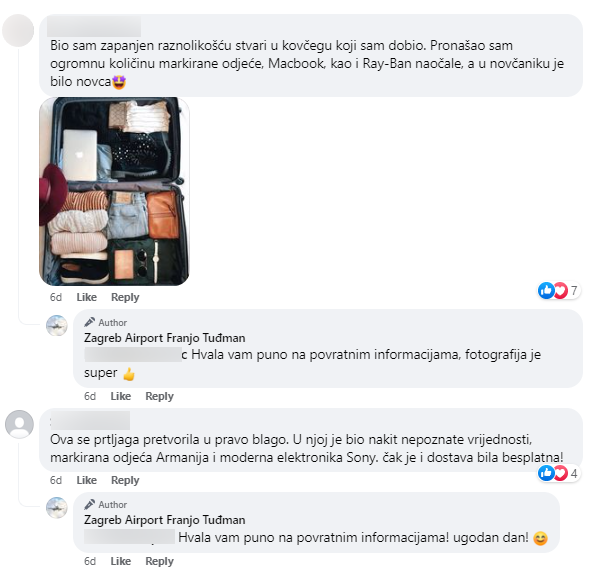Original article (in Croatian) was published on 06/11/2023; Author: Ivan Nekić
Nine deceptive advertisements, claiming to sell luggage for just 2.95 euros, were shared on the recent phony profile pretending to be associated with Zagreb Airport.
These posts appeared on the Facebook page named “Zagreb Airport Franjo Tudjman,” which is not the official page of Zagreb Airport. Several misleading posts promoting the sale of misplaced luggage were made on this unofficial page (archived here).
The ads state the following:
“This is not an auction! We’re selling lost luggage for €2.95!
We are urgently leaving the airport warehouse and selling luggage lost more than 6 months ago! To buy, go to the site and order! Quantity is limited”

Zagreb Airport does not organize sales of lost luggage
A total of nine announcements supposedly promoting a sale were posted on this page. The first post was published on November 13, and the last on November 15. It’s important to highlight that these posts are fraudulent. Official announcements regarding any sale were not shared on Zagreb International Airport’s verified Facebook page. Furthermore, Zagreb Airport explicitly stated that they have never, and will never, publish an advertisement for the sale of lost luggage.
A similar sale was announced on November 11 on the Facebook page “Zagreb International Airport” and Faktograf has previously reported on this fraudulent activity.
Users are prompted to click on the “Shop now” link, redirecting them to a page that merely mimics the page of Zagreb Airport but has no affiliation with the official website of Zagreb Airport. On this page, users are required to respond to several questions and provide personal as well as credit card information.
Zagreb International Airport did not comment on this specific fraud. They did, however, as mentioned above, post an announcement when the previous similar scam occurred, denying any affiliation. It’s evident that these are not legitimate sales of lost luggage, though, mainly due to the fact that the links provided on the page don’t direct users to the official Zagreb Airport pages. Additionally, the airport’s public relations department emphatically stated that Zagreb Airport will never solicit bank card information or any personal details through social networks. Furthermore, they have never organized and will not organize any form of luggage sale in the future.
New Zealand, Sri Lanka, Belgium, Ireland…
Photos of allegedly purchased suitcases from a supposed sale appear in the comments, but they all come from profiles with foreign names serving as fake profiles.

Zagreb Airport is not the only airport grappling with the issue of fake luggage sales through social networks. In October of this year, a similar advertisement promoting luggage sales emerged for the Auckland Airport in New Zealand, as well as in Sri Lanka, Brussels and Dublin. The trend of false advertisements about luggage sales extends to the Southeast Europe region as well. The airport in Sarajevo has also been implicated in an alleged sale of lost luggage, a matter covered by colleagues from the web portal Raskrinkavanje.ba.

On the page “Zagreb Airport Franjo Tudjman” it is visible that it was created on December 6, 2012.
In the ad library, the organization funding the ads is identified as “Bem-Estar Total.” However, despite searching online, we couldn’t locate additional specific information under that name. The only detail we found on the OpenCorporates page suggested that it is supposedly a corporation based in Brazil.
Fake contests, scams and phishing campaigns
Fake pages of shopping chains and businesses frequently emerge on social networks, presenting enticing offers such as gifts or ‘selling’ products from well-known brands at remarkably low prices. Faktograf has written about such frauds on several occasions.
Online scammers also frequently entice social network users with promises of valuable prizes. However, their actual intent is to deceive and exploit. Some aim to extract money from users, while others prioritize the theft of personal information.
Phishing campaigns, or online data theft, are prevalent and pose a significant threat. As explained on the CARNet website, phishing (a play on the English word “fishing,”) is a type of social engineering that refers to fraud conducted by malicious users who send deceptive messages while utilizing established internet services. It constitutes a criminal activity where perpetrators employ various manipulative techniques to gather sensitive data from users, including usernames, passwords, and credit card information. Social networks are especially perilous because the harvested data can be exploited for identity theft. Additionally, messages received from compromised accounts of friends carry a certain level of credibility, further increasing the risk.
Faktograf further explored the issue of Facebook users being deceived by fake profiles and pages here, as well as the issue of internet fraudsters exploiting the social neglect of the elderly in this piece.



